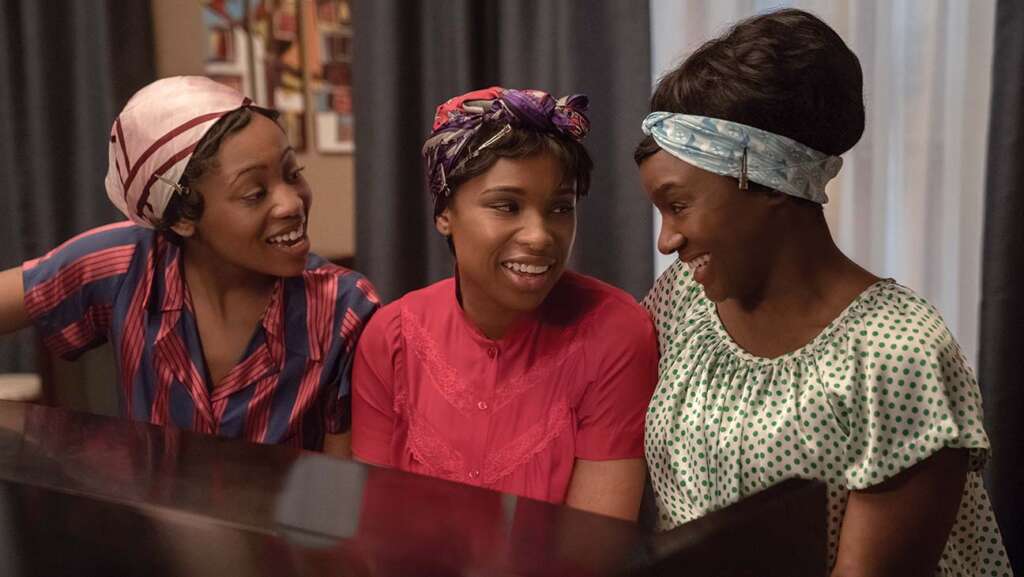Liesl Tommy makes her feature directorial debut in a film that was supported and co-developed by Aretha Franklin herself before her death in 2018. Respect celebrates her life and career.
South African born Tommy has forged a celebrated career on the stage, including winning an Obie and Lucille Lortel Award, and nominated for a Tony Award for directing Eclipsed on Broadway. As Tommy was the first woman of colour to be nominated for a Tony Award for direction, what better celebrated direction could be fit for a feature film debut in bringing to life the music, majesty and might of the late, great Aretha Franklin. She brings her eye for great character focus, set design and storytelling on the stage to the screen, immersing you in the rich African American culture of gospel, race and the music industry across a defining decade.
Similar to James Mangolds’ 2005 Johnny Cash biopic Walk the Line, the story of Aretha takes place at a defining point in American music history, exploring the influences and cultures behind the music that lent as inspiration to young adults who had a voice, but no clear direction where to take it. Yet, it’s wonderfully refreshing to be reminded of a period where artists were reliant on their natural skill, passion and talent to produce music from the heart in studio sessions; great, toe-tapping and insightful stuff.
From Detroit 1952 and a rousing rendition of “My Baby Likes To Be-Bop” from brilliant ten year old Skye Dakota Turner, to 1972 and the equally brilliant Jennifer Hudson belting out “Amazing Grace”, the twenty year rise of gospel star Aretha Franklin is brought to life with soul, but not in the usual “rags to riches” story that frequents most biopics. In fact, this is a “riches to riches” story; Aretha is born into a solid, loving family who have provided for her. The real battle through her story is cutting the strings of those pulling her in various directions and being brave enough to find her own unique style and voice.
Strong support comes from Forest Whitaker as overbearing father and minister C. L. Franklin and Marlon Wayans as equally overbearing, but abusive and volatile, husband Ted White. Both these actors deliver at the top of their game with the great drama and emotion required, showing how the male role-models in her family caused most of the unrest and often heartache, fuelled by race, by their beliefs and their addiction. Both channel a real power to their roles, especially Wayans coming into his own as a serious actor who has great sinister screen presence when he’s alongside Hudson.
Yet it’s Hudson who is the beating heart and soul of this story. With her track of award-winning acting and singing roles across film, and with Franklin herself wanting her as a lead, Hudson has the screen presence and voice of such power to become the Queen of Soul effortlessly, belting out hit after hit. With the narrative points on offer, she does as she’s expected in delivering all the highs and lows of a personal and professional life, but you can’t help thinking she could have gone a little further with it. A little deeper. But that’s down to the source material on offer, not the performance. You can’t imagine anyone else playing the Queen of Soul with such power in a film. It’s great to see some of the foundations behind her iconic songs such as “Respect” and “Think” (with no Blues Brother in sight, sadly!).

This is a firm biopic that is there for everyone, for hardcore Aretha fans who know her life story back to front, and the casual audience. As with biopics, most recently like Bohemian Rhapsody, there is artistic licence used to edit parts of the timeline, brush over others and adjust moments for dramatic effect which is something now expected for entertainment purposes. However there seems to be a little too much brushing over when you long to tap into some of the struggles that helped shape Aretha. A childhood pregnancy, the abusive relationship with White, the struggles with her father and discovering the soul / R&B genre in a competitive industry – highlighted brilliantly via a small confrontation with Mary J. Blige’s starlet Dinah Washington. An example of this is exploring a time when Aretha nearly lost it all to drink when she fell on stage, but this resolves itself in a matter of minutes just as the real humanity of the woman comes through. It could have used more time to focus on the defining points of this career and life, not just the glossy ones. On the flip side to this, the narrative focuses more on relationships between core characters than over personal struggles and addiction battles that we’ve seen time and time again in biopics.
It avoids going too deep into the darker side of Aretha’s life, but with her family so involved, it’s to be expected and certainly doesn’t suffer for it unless you know what to look for, and this certainly isn’t a film to use as an excuse to dig for demons. This is a fair paced drama that does seem to sag in the middle between set-pieces and goes on a little longer than it needs to; emotions are batted back and forward and there is little else surrounding Aretha bar her relationships to deal with, and sometimes it could benefit from a little more. There is also a little imbalance with the colour grading over the period – sometimes the colours and lights ooze from the screen and really bring the 60s to life in a gorgeous way. Other times, it just fades and doesn’t look vibrant at all. But maybe this is a subtle metaphor for the two sides of Aretha’s life – the glam and the gloom?
Verdict
It may not take risks to be more memorable, but it is a “Respect”ful production filled with classic songs and solid performances that would make an effective stage musical; the confident direction and character based narrative couldn’t be more suited for a Broadway show.




